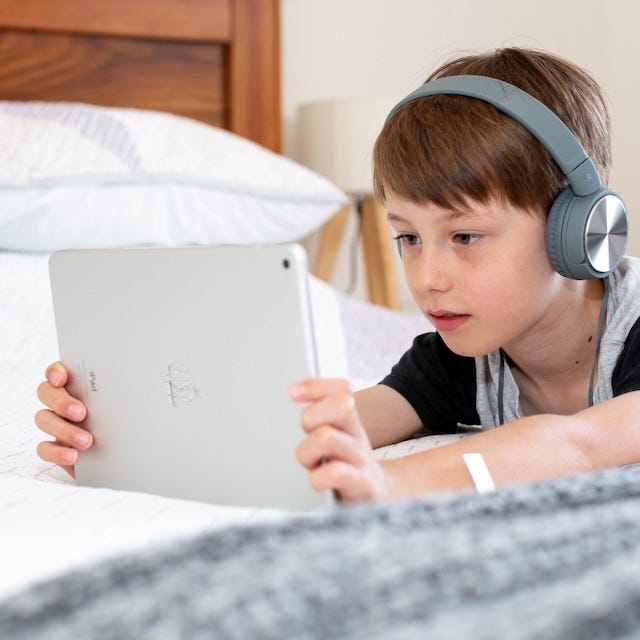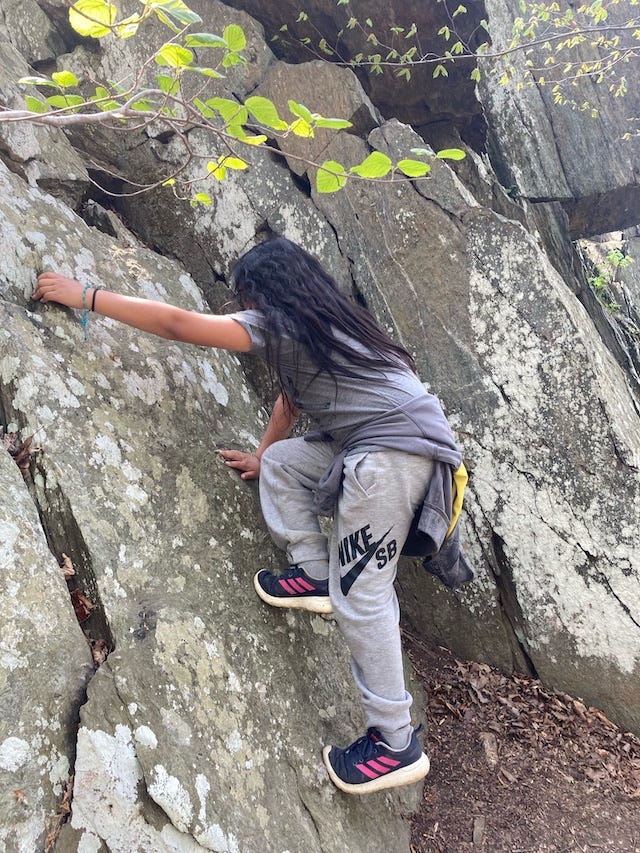How to take a vacation your kids will actually enjoy, a vacation case study featuring a grandkid and her tablet, and discovering tiny wildflowers
The Art and Science of Parenting #8
By: Glenn Collins and Catherine Lynch
Dear awesome parent,
It’s vacation planning time! We had a less than ideal vacation many years ago. (We made some assumptions that turned out to be wrong.) Since then we’ve talked to other parents, hopefully become a wee bit wiser, and we made ourselves a little guide on How to do it better next time. Here’s the glorious, painful details, and the guide we wish we’d had:
Has this happened to your family?
“We are never taking the boys on vacation again! Next time, we’ll just leave them home with a case of chips, a case of soda, and a Netflix account. They’ll have more fun, and frankly so will we.” We were only half way through a summer vacation with 3 of our teens when Glenn made this announcement.
The backstory: We flew to Colorado for a two week vacation in the front range - Boulder, Denver, Colorado Springs and the surrounding areas. Beautiful, spectacular scenery. We had decided it would be great idea for the boys to experience the spectacular views and mountain ranges of the west, as we live on the flat East Coast of the US. (“We had decided” should be your first clue this wouldn’t go well…)
This is our idea of the ideal vacation:
To make a long story short: They begged to stay in the hotel. It was work to wake them up and drag them out for the day. They were frequently miserable, with 2 notable exceptions: when Glenn did a header over the handlebars of his mountain bike and they got to laugh at him, and when I was experiencing altered mental status due to lack of oxygen on Pike’s Peak (a 14 thousand foot mountain, notorious for causing problems for flat landers) and they got to laugh at me. Other than that, it was kind of a grind.
Turns out this was our kids’ idea of the ideal vacation:
We’ve talked to lots of other parents about this. Here’s the consensus of how to make it more likely that everyone will have a great time on vacation:
Our new vacation strategy:
Ask questions, give agency, then make the reservations.
Ask questions:
Who’s it for? Have open and honest conversations about who the vacation is for. Usually the answer is “All of us,” but sometimes it’s not. Is it for the parents, because you’ve always wanted to go to name some cool place, or is it specifically for the kids because they want to to see or experience X?
What’s it for? Is it for relaxing, because you’re all stressed out? Or is for fun and adventure because you’re bored/ you love the adrenaline rush? Is it for spending time with the kids because you work too much? Is it for learning a new skill? Or doing charity work? And perhaps most importantly, does everyone have the same goal?
Give agency:
Agency: Let your kids be part of the discussion about where you go and what you do on vacation. If you’re really feeling brave, give them a budget and a geographic area and let them plan part of the vacation. Destinations, activities, food, and lodging are all open for discussion. Or give each kid a day where they get to choose all of the above. Again, on a budget.
Considerations:
Expectations. Vacation means something different to everyone. Are you looking for peace and quiet at the beach with a book? Are your kids looking for fun and adventure at a water park? The closer your expectations are, the more fun everyone will have. Make that happen by having lots of conversations, which ironically, means more listening than talking.
Togetherness. Family vacations usually means a lot of togetherness. Be sure to plan ways for everyone to get some alone time.
Tablet/Phone time. Devices are a fact of life. Have discussions about everyone's use of electronics during the vacation. It might go against some parents’ idea of what vacation is for (it sure did for us!), but budgeting in a certain amount of tablet time for the kids can make the experience better for everyone.
Moms often do more work. How can you make sure Mom has just as much fun as everyone else? How can you make sure everyone does (and expects to do) some of the heavy lifting?
How do you want to feel when you get home? Relaxed and refreshed? Or exhausted from all the fun you’ve had and needing downtime to recover before you go back to work?
Are you going on vacation with a kid and their device anytime soon?
Here’s our lessons from last weekend:
We took a 10 year old granddaughter to Virginia for the weekend.
In our minds, we did everything right:
We asked if she wanted to go. (She did.)
We told her the itinerary. (She was excited.)
We packed her favorite snacks. (potato salad and mixed nuts)
….Cue the dramatic music….
We forgot to set expectations for device use. The backstory: Her mom let her bring the family tablet for the weekend, a rare privilege. (Usually her little brother had it.) She was looking forward to lots of tablet time. (We didn’t know that.)
The first disappointment: No wifi in the car. We told her there was wifi at Aunt Belinda’s house, and she could use it there.
The second disappointment: There were lots of things to do at her aunt’s house that didn’t involve being alone with the tablet. Things like feed the rabbit. Play with the dog. Talk to the relatives. Eat dinner. Be sociable.
The third disappointment: At the park, she discovered she didn’t like hiking very much. And she wasn’t as good at rock climbing as she thought she would be. And she had to leave the tablet in the car. Again.
Here’s the lessons we learned:
Know which devices they’re bringing and what their hopes/dreams/goals are for device use.
Set realistic expectations for when and how they’ll use their devices and what other activities they’ll be expected to participate in.
When planning a vacation, even just a weekend getaway, the device conversation is right up there with the conversations about food, hotels, and plane tickets. Woe is you if you forget to plan for the device.
Despite limited tablet time, here’s what she said Sunday night:
“This was the best weekend ever!"
Glenn's tiny flower photos:
I’ve recently discovered the world of tiny wildflowers. Of course they’ve always been there, but for most of my life I’ve stepped over (or on!) them and never noticed. They were simply a part of the background.
As my interest in photography grew, the tiny dots of color on the ground caught my attention. When I looked closer, I discovered a world I never knew existed. Suddenly I couldn’t take a walk or go outside without seeing them. They’re everywhere. And they’re beautiful!
Our kids are like that too. They have hidden depths we’ll never know are there unless we take the time to look for them. Their thoughts, feelings, and dreams - they’re all available for us to know. All we have to do is take the time to look and listen.





